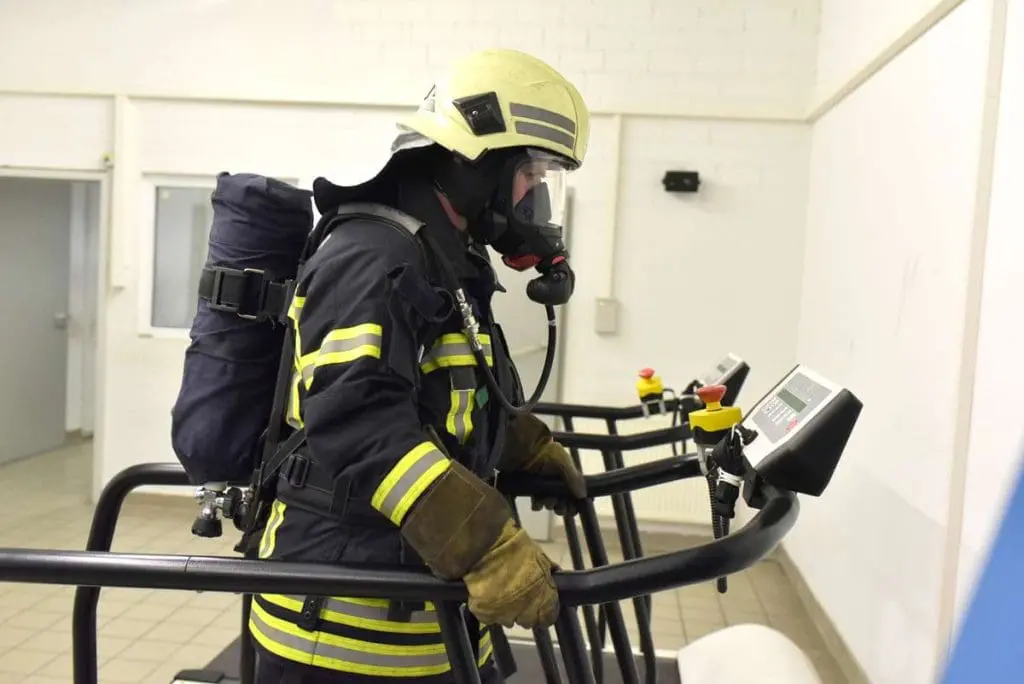Firefighters work in demanding, hazardous environments. To minimize the risk of injury and illness on the job, fire departments can implement occupational health programs based on the National Fire Protection Association (NFPA) – NFPA 1582.
NFPA 1582 sets minimal requirements for occupational health programs for firefighters. For example, the standard provides guidance for medical evaluations of new hires and serving firefighters, including medical history, laboratory tests, and other screening to detect medical conditions and medication use that could adversely affect their ability to safely perform essential job tasks.
In this blog, we explore what the NFPA 1582 standard is, its purpose, medication disqualifications under NFPA 1582, and how firefighters and fire departments can navigate these disqualifications.
Table of Contents
An Overview of NFPA 1582
The physically and mentally demanding nature of firefighting and the harsh environmental conditions under which firefighters must perform their duties significantly increases stress, overexertion, and leaves firefighters susceptible to developing medical conditions, including hypertension, diabetes, high cholesterol, obesity, and even cancer.
According to the International Fire Chiefs Association (IFCA), nearly half of all firefighter fatalities occur as a result of medical emergencies.
What is NFPA 1582?
To mitigate this risk and ensure a resilient and healthy firefighting force, fire departments have adopted NFPA 1582 as the standard for medical testing and physical exams for new hires and serving firefighters. Indeed, the IFCA’s recommends that every firefighter should receive an annual medical examination that follows as closely as possible the guidance of NFPA 1582.
What is the NFPA 1582 standard for medical exams?
According to NFPA 1582, new hires and incumbent firefighters should undergo the following physical evaluation and medical testing to ensure they are performing at their best:
- A comprehensive medical history review
- Physical examination
- Blood tests
- Urinalysis
- Vision tests
- Audiograms
- Spirometry
- Chest x-ray (as indicated)
- ECG
- Cancer screening (as indicated)
- Immunizations and infectious disease screening (as indicated)
Additionally, NFPA 1582 recommends tests for aerobic capacity, body composition, grip, arm, and leg strength, muscular endurance, and flexibility.
The Goal of NFPA 1582 Standards
The goal of NFPA 1582 standards is to detect any physical or medical condition(s) that would preclude a new hire or incumbent firefighter from performing their duties without risk to the safety and health of themselves or others.
After individually evaluating an individual and their medical records, a licensed physician will state whether that person can or cannot perform their essential job tasks due to a specific condition.
If the firefighter presents with a disqualifying condition or medication, the physician can recommend restricting that individual from performing tasks that cannot be safely performed given their medical condition. It’s at the district’s discretion whether an accommodation can be made as opposed to imposing a blanket prohibition from performing that task(s). The individual may also be moved to another position.
Note: NFPA does not enforce the 1582 standard and there is nothing to stop districts deviating from or setting their own requirements.
Delving into NFPA 1582 Medication Disqualifications

In addition to disqualifying medical conditions – such as skull defects, chronic vertigo, pulmonary hypertension, asthma, coronary heart disease, and more – NFPA 1582 standards also define medications that could disqualify a firefighter from duty.
Defining Medication Disqualifications According to NFPA 1582
A medication disqualification may be arrived at if a candidate or incumbent regularly uses medication that may interfere with his/her ability to safely perform essential job tasks. Each fire department determines what is considered an essential task.
To determine this risk, at the time of hire and annually thereafter, a firefighter will undergo comprehensive medical history review and a physical examination. During the review, the firefighter must also provide details about medication use, including:
- Each prescription medication they take
- Medical condition being treated
- Name of the prescribing physician
- Dose
- When taken
- Purpose
- Stop date
- Any monitoring required (e.g. lab tests every X weeks).
The medical history questionnaire also requires information about over-the-counter medication usage or discontinued medications in addition to any allergies, side effects, reactions, or intolerance experienced.
The department may also request that the firefighter’s health care professional complete an occupational health medical questionnaire, including information about prescription medications and the condition being treated.
Common Types of Medications that Lead to Disqualification
Medications that could lead to disqualification from duty include, but are not limited to:
- Anticoagulation drugs: Blood thinning medication (any anticoagulant medication that prolongs prothrombin time (PT), partial thromboplastin (PTT), or international normalized ration (INR), or beta-adrenergic blocking medication) is listed as a Category A medicine by NFPA 1582 meaning those who take it will be unable to serve as a firefighter.
- Narcotics: Because they can conceal a pain issue, such as a spinal or skeletal condition or other disqualifying condition that prevents an individual from becoming a firefighter, narcotics are considered a disqualifying medication.
- Seizure medication: Epilepsy medication may be disqualifying if it causes side effects.
- Sedatives and hypnotics: Medications for ADHD and other mental health conditions like bipolar disorder are prohibited by NFPA 1582. These include clonidine and Xanax/alprazolam.
- Anti-hypertensive agents: NFPA 1582 lists certain hypertension medications as disqualifying, including beta-blocking agents such as Metoprolol and Atenolol, and other medications like Clonidine, Furosemide, and Spironolactone. Hypertension that is uncontrolled, poorly controlled, or requires medication is likely to interfere with the performance of duties.
- High-dose corticosteroids: Anti-inflammatory medications, such as corticosteroids, may interfere with the ability to perform aerobic-intensive tasks and could be disqualifying. Candidates are advised to stay off these medications for at least four weeks prior to the test.
- Psychiatric medications: Stimulants including methylphenidate/Ritalin/Concerta, dexmethylphenidate/Focalin, and dextroamphetamine/Adderall may be taken, but only if the individual can still perform essential functions.
Impact and Implications of NFPA 1582 Medication Disqualifications
NFPA 1582 is designed to ensure that firefighters will not be overexerted or overstressed by the challenges they face.
Identifying any NFPA 1583 medication disqualifications is an important preventative step that ensures the well-being and safety of firefighters, many of them volunteers.
However, because medication use can mean the difference between staying on the job and removal from duty, each firefighter must be carefully evaluated. Medical examiners must be certain that the medication is not disqualifying and does not result in reactions or side effects that could impact a firefighter’s health, safety, and ability to perform essential tasks. Examiners and departments must also avoid any discrimination based on a firefighter’s medical disability.
How Medication Disqualifications Affect Individuals and the Fire Service
If a new hire or incumbent firefighter is found to be taking a disqualifying medication or have a disqualifying medical condition, the consequences can be significant, including:
- Loss of job or failure to qualify for a new firefighting opportunity.
- Financial impacts, including loss of income and benefits.
- For the fire department, the loss can impact operations, morale, and effectiveness.
For this reason, any decision to disqualify a firefighter is not taken lightly by fire chiefs. If a firefighter is disqualified due to medication or a medical condition, the department should provide support and resources to assist the firefighter’s transition to a new opportunity or make accommodations for them to perform non-essential tasks.
Legal and Occupational Implications
Medical conditions or issues may be considered disabilities, and any medication disqualifications could have legal and occupational implications under the Americans with Disabilities Act (ADA).
The ADA prohibits fire departments from discriminating against otherwise qualified people. Individuals must be judged on what they can do, not their perceived limitations. Furthermore, the ADA requires employers to make reasonable accommodations for those with recognized disabilities.
For instance, while certain disabilities (and medications) can disqualify individuals from pursuing or maintaining a career as a firefighter, others may not pose a hindrance. NFPA 1582 standards underline the significance of conducting physical examinations to identify any physical or medical conditions that could potentially impede a firefighter’s safe performance of essential job tasks. The determination of an individual’s “ability” in this context is left to the discretion of each examiner and department. Moreover, each department has the autonomy to make its own hiring decisions.
In cases where concerns related to ADA issues arise regarding disqualifying medications and/or conditions and the determination of what constitutes a disability, fire districts should seek guidance from legal counsel.
Navigating NFPA 1582 Medication Disqualifications

Below are steps that firefighters and fire departments can take to navigate MFPA 1582 medication disqualifications.
Steps for Firefighters
To prepare for the NFPA 1582 physical exam, firefighters must understand what the exam involves and any potential mitigating factors, such as pre-existing medical conditions or medications that are considered disqualifying.
Above all, firefighters should be honest with the department. If they do have potentially disqualifying issues, it’s not a given that this will preclude them from serving. NFPA 1582 standards are simply guidelines, they are neither prescriptive nor enforceable.
If a firefighter is found to take medication that affects their ability to be hired or retained, there may be other non-essential tasks that they can perform. Alternatively, they may be able to address underlying health problems by following the advice of a healthcare provider and resume frontline firefighting duties in the future. Indeed, the best way to prevent disqualification is to maintain good health and fitness.
Steps for Fire Departments and Occupational Health Professionals
No fire chief wants to risk losing valued employees. But preventative measures, such as regular on-the-job medical exams, can help firefighters and departments prevent instances of disqualifying medical conditions and medications. New hire and annual medical screening can also serve as a benchmark to monitor changes in firefighters’ health over time.
Additional measures to consider involve implementing health and medical management training programs aimed at increasing firefighters’ awareness of occupational health hazards and promoting best practices for overall well-being.
If medical or medication disqualifications happen within their teams, department chiefs should treat each case on an individual basis. No two people are the same and outcomes will depend on the severity of the condition and overall health. For example, a mild case of hypertension may not be disqualifying if an adjustment in medication or lifestyle will help. Case in point, the FDNY Bureau of Health Services (BHS) has required some candidates to lose weight before they could be appointed.
NFPA 1582 Medication Disqualifications: FAQ

What are NFPA 1582 standards?
NFPA 1582 is the standard for medical testing and physical examinations for new hires and serving firefighters. The standard is merely a guideline for occupational health and safety and is not enforceable.
The standard was developed by the National Fire Protection Association (NFPA) and is recommended by the International Fire Chiefs Association to screen and evaluate medical conditions and physical fitness that may impair a firefighter from safely performing essential tasks.
What are NFPA 1582 medication disqualifications?
NFPA 1582 disqualifying medications are prescription medications that may give cause for exclusion from duty. Medications include narcotics, certain anticoagulants, anti-hypertensive agents, sedatives and hypnotics, high dose corticosteroids, and more.
Can firefighters take Adderall?
Adderall and other psychiatric medications may be taken, as long as the firefighter can still perform essential functions.
Balancing Safety and Accessibility in the Fire Service
Firefighters face daily hazards on the job. Occupational health programs and physical exams based on NFPA 1582 can help minimize the risk of injury or illness.
While many conditions and medications listed in the NFPA 1582 standard can result in exclusion from duty, there are steps that firefighters can take to maintain health and fitness. Regular medical checkups, exercise, avoiding alcohol, and maintaining a balanced diet can help firefighters prepare for the NFPA 1582 physical and continue to serve in this demanding but critical role.
If you are looking to start or optimize your occupational health program and implement the NFPA 1582 standard, contact us to learn more about how Acuity can help.
Learn more about Acuity Fit-for-Duty Exam.
